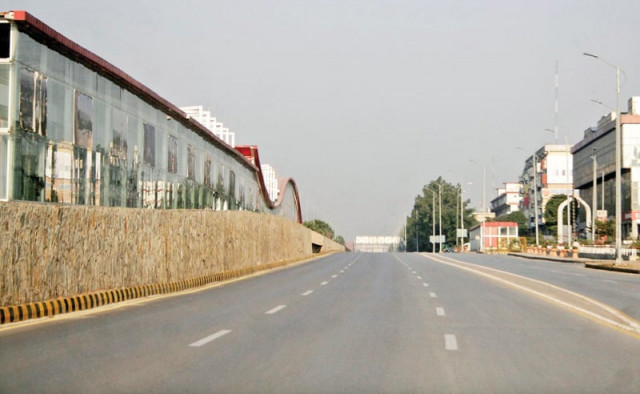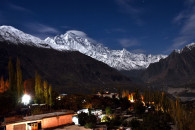Businesses in twin cities open, but get only flies
Sunday bazaars witness usual rush of customers as traffic largely stays off the roads

Roads of the capital bear a deserted look while the Malikabad Shopping Centre on Sixth road remains draped in cloth. Shoppers flock to stalls at the Sector H-9 Sunday bazaar. PHOTOS: ONLINE, WASEEM IMRAN/EXPRESS
Blockade makes residents of twin cities anxious
On Saturday, an abortive operation by law enforcement agencies to clear Faizabad of supporters of Tehreek Labbaik Ya Rasool Allah (TLYR), who have been camped at the intersection since November 8, left at least six protesters dead and over 150 protesters and security officials injured.
The operation also failed to clear Faizabad of the protesters.
It was no surprise then that traffic remained thin on most of the thoroughfares of the capital, often appearing to be a ghost town.
Murree Road, Ninth Avenue, Islamabad Expressway and other major roads linking the two cities, usually full of commuters even on a Sunday, were empty.
While intra and intercity commuters preferred to stay at home the situation was exacerbated after public transporters decided to keep their vehicles parked in their garages.
The Islamabad Expressway was blocked at Koral Chowk, while traffic coming from Lahore, Jhelum, Kahuta, and southern parts of Azad Jammu and Kashmir via the Grand Trunk Road were diverted towards airport road.
Intercity cargo traffic was also negligible which created a shortage of supplies in some areas of Rawalpindi and Islamabad particularly in areas adjacent to Faizabad.
However, the roadblocks continued to cause anguish to residents in both cities.
Yasir Ahmed, a resident of Rawalpindi, said that his wife had been admitted to the emergency ward of Benazir Bhutto Hospital.
However, due to the protests and roadblocks, he could not reach the hospital from his residence in Dhoke Kala Khan to take care of his wife at a crucial moment.
Ahmed termed the ongoing protest the worst sit-in in the twin cities since they were not only affecting people living around Faizabad, but also those who commute between Rawalpindi and Islamabad on a daily basis.
Comparing it to past sit-ins in the capital, he recalled that during the four-month-long protest of the Pakistan Tehreek-e-Insaf (PTI) and the Pakistan Awami Tahreek (PAT) in 2014, the locals were not tortured, nor did the protesters misbehave with residents.
No customers
Defying the tense atmosphere in the twin cities, major shopping centres and bazaars including Sixth Road Electronic Market, Satellite Town, Raja Bazaar, Saddar opened on Sunday. However, predictably, bazaars at Faizabad and Shamsabad remained closed.
However, it was not smooth sailing for the bazaars which opened with shopkeepers complaining that few customers showed up. Very few shops in the Sector I-8 Markaz opened.
“When all the roads are closed, how will the customers reach the markets to shop?” asked Rawalpindi Chamber of Commerce and Industry (RCCI) Senior Vice President Muhammad Nasir Mirza.
Speaking to The Express Tribune, he said that the business community at Faizabad and Shamasabad had been swallowing bitter pills ever since the sit-in of TLYR began earlier this month.
He held the government responsible for the miseries of the business community and of the residents of the twin cities for mishandling the protest.
Bucking the trend, all Sunday bazaars in the capital saw a rush of customers, including those at the Sectors H-9, G-10, and Aabpara markets.
Businesses also remained unaffected at posh markets including Jinnah Super, Super Market and Centaurus Mall though stores seemed to be short staffed.
Prices spike
For the few customers who did venture to the markets, they found that prices of essential items had spiked.
Twin cities in lockdown for Muharram 9 procession
Poultry prices rose from Rs120 per kilogramme to Rs160 per kilogramme since supply delivery vehicles were not allowed to enter parts of Rawalpindi and Islamabad.
“Today, the wholesale mandi (market) of poultry opened at Rs6,500 per maund (one maund is 37 kilogrammes),” Akhlaq Ayub, a poultry retailer at Dhoke Kala Khan said.
Published in The Express Tribune, November 27th, 2017.



















COMMENTS
Comments are moderated and generally will be posted if they are on-topic and not abusive.
For more information, please see our Comments FAQ